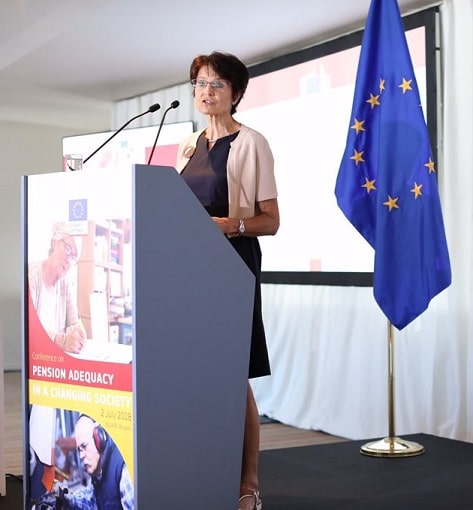
Following the publication of the two volumes of the Pension Adequacy Report 2018 on 30 April 2018, the European Commission organized a conference on 2 July 2018 in Brussels to discuss the outcomes of the report and pension adequacy in a changing society.

After a brilliant summary of the Pension Adequacy Report by Andras Rangus, chair of the Social protection Committee Working Group on Ageing Issues, and an interesting response by Prof. Frank Vandenbroucke, former Belgian Minister for Social Security, Health Insurance, Pensions and Employment on his proposal to Belgian authorities to apply the Musgrave rule to achieve equity and sustainability, the Bulgarian EU Presidency and the EU social partners were invited to comment on the report and their vision of pension adequacy.
AGE calls for action to address gender pension gap
The following panel discussion addressed “gender and old age: how to overcome the gender pension gap”. Anne-Sophie Parent, Secretary General of AGE, welcomed the greater attention paid to gender inequalities in the report but recommended to go further and to develop additional profiles based on several female careers to better assess the impact of pension reforms. While most reforms seek to strengthen the link between pension contributions and benefits, if no mechanisms are put in place to adequately compensate for legitimate career breaks such as maternity and parental leave and informal carer’s leave, the gender pension gap will continue to increase. Ms. Parent also insisted that other tools should be developed to assess pension adequacy than the replacement rate which only looks at how much is the average pension compared to the average salary. In AGE’s view pension adequacy can only be measured in comparison to the disposable income older persons need to have a dignified standard of living, not just to be above the poverty threshold. New instruments such as basket of goods and services should be developed for both young retirees and very old persons to better assess if their pension is adequate to cover the goods and services they need to live in dignity. This would enable to better assess the impact of policy decisions taken in other areas, such as cuts in reimbursement of health and tong-term care, free or subsidized public transport, negative impact of poverty threshold on those who are just above, etc.
Ensuring adequate social protection in new forms of employment
The 3rd panel tackled the challenges faced by workers in non-standard work, sub-standard retirement with regard to their pension rights. New types of employment are arising where the social protection is more difficult to organize and these workers will not accrue enough pension rights when they will reach retirement age. Pension systems must accommodate new forms of employment while ensuring that enough contributions are made to the system to deliver an adequate income in old age.
Some further proposals for sustainable adequate pensions
The final panel tried to identify what needs to be done to ensure pension adequacy in the future. Hervé Boulhol (OECD) stressed the importance of balancing adequacy and financial sustainability objectives to ensure intergenerational fairness, a pre-conditioning for the long-term social sustainability of our social protection systems. Gijsbrecht Dekkers, Belgian member of the Social protection Committee, recommended that while ensuring that the first pillar pension remains the main source of old age income it was necessary to extend the cover of supplementary occupational pensions to all workers and to exclude personal pensions from the adequacy discussion as these are personal savings. Mr. Dekkers also asked the audience whether it would be useful to further develop the online information service that enables everyone in Belgium to get an estimate of his/her pension rights by adding the possibility to check what impact would reducing to part-time or getting divorced have on one’s future pension rights. AGE welcomed Mr. Dekkers’ suggestion as very useful to ensure workers are better informed before they take such important decisions.
More information on this conference can be found at: https://ec.europa.eu/social/main.jsp?catId=88&eventsId=1329&furtherEvents=yes&langId=en






